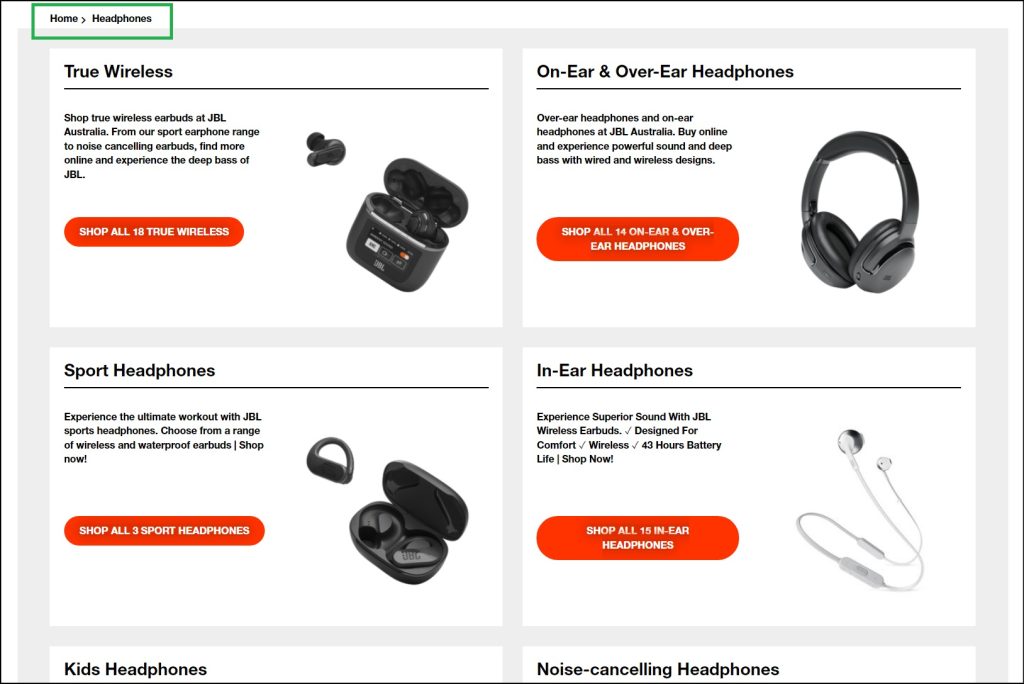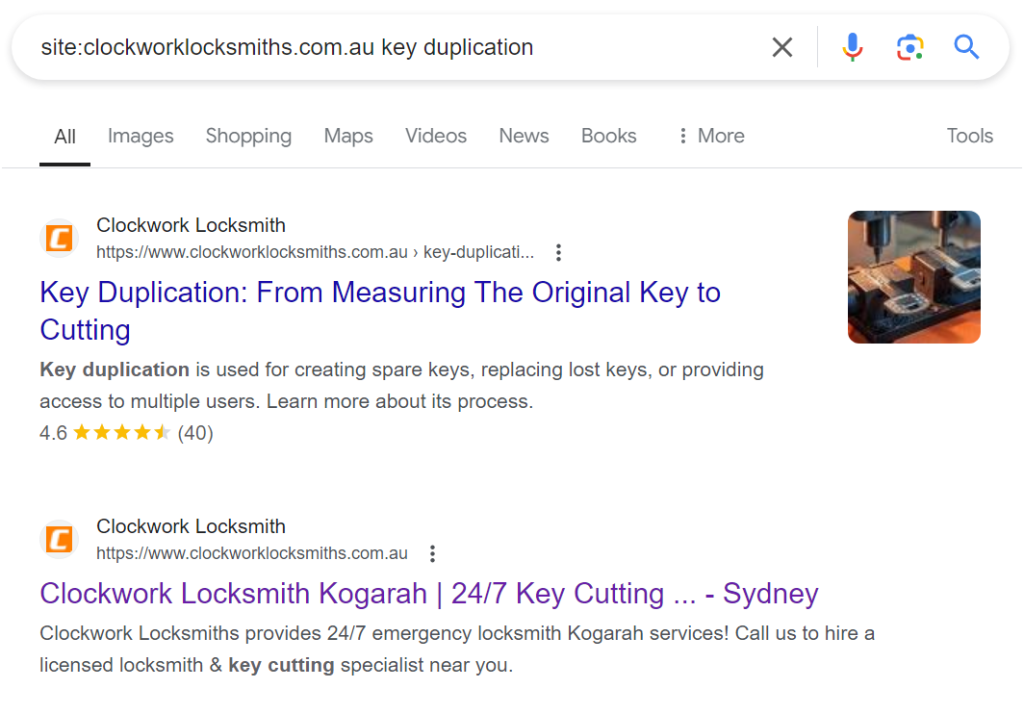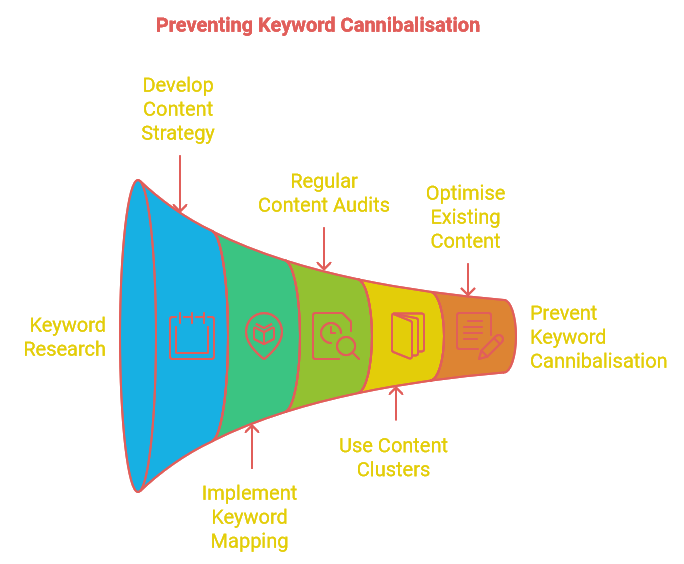Your website’s packed with quality content, and you’re doing everything right to boost your rankings in the search engine results pages.
But something’s off. Your pages aren’t performing as well as they should be.
Enter keyword cannibalisation – a relatively common issue even experienced SEOs commit, which can wreak havoc on your organic search marketing strategy.


Keyword cannibalisation occurs when multiple pages on your website target the same or very similar keywords.
See this example below for a local electrical company’s website pages.

All of these pages target the same keyword with a slight variation, but nevertheless satisfies the same commercial intent – people searching for any of these keywords are looking for local electricians.
They can all be used in the homepage instead of creating individual pages for each search term, which is the perfect recipe for keyword cannibalism.
While it might seem like covering all bases, it actually confuses search engines and can dilute your content’s effectiveness. Here are more insights to consider:
A related and yet another common SEO mistake is keyword stuffing.
While keyword cannibalisation splits Google rankings when two or more pages rank for the same keyword, the former is a black-hat tactic involving the unnatural and often excessive usage of a target keyword within a content.
Both misuse the value of keywords and must be avoided at all costs.
While a keyword cannibalization problem can negatively impact your SEO, it’s equally important to distinguish between genuine issues and common misconceptions.
Here’s what typically does not qualify as keyword cannibalisation, and therefore nothing to worry much about:
When different pages on your site target similar keywords but address distinct search intents, it’s not considered cannibalisation.
Remember that for it to be considered as such, two or more pages must be targeting the same keyword with a similar intent.
For instance, a blog post about ‘DIY home repairs’ and a service page about ‘professional home repair services’ may both target, at least in part, related keywords. But they cater to different user needs.
The former has purely an informational intent, while the latter is commercial. The searcher is looking for businesses or professionals they can later hire.
Differentiating content based on user intent helps avoid internal competition and enhances overall site relevancy.
Keyword overlap is not an issue if your pages focus on different aspects of a broader topic.
For example, you have a product page for ‘headphones’ in your ecommerce store.
You can create subpages or categories for ‘wireless,’ ‘noise-cancelling,’ and ‘sports’ versions without cannibalising the main page.
See this page from JBL Australia.

However, you may run the risk of ranking your main category page for specific keywords that should have been awarded to your sub-pages.
Content creation plays a major role here to avoid making cannibal pages.
If you want to rank your ‘wireless headphone’ page for that exact keyword, make sure it has a dedicated page with sufficient product descriptions and other relevant information.
Having thin content for that subpage gives Google the impression that it’s not that important of a page after all.
Another tactic you can use is internal linking. Write a blog about noise-cancelling headphones and make sure to link it to its product page using a descriptive anchor text.
Make sure it’s optimised for on-page SEO. That is, the target keyword must be mentioned in the headings, URL slug, and product listing.
Pages targeting keywords with low competition or very niche queries usually don’t suffer from keyword cannibalisation.
When the keywords are not highly competitive, the risk of multiple pages competing for the same position is minimal at best.
In such cases, internal overlap is less likely to impact overall search performance considerably.
If your site includes content tailored to different geographic locations, it’s not considered keyword cannibalisation.
A page targeting ‘plumbers Sydney’ and another for ‘plumbers Melbourne’ are addressing separate markets.
Here’s the locations page for A One Korean Painting, where it has individual pages for different areas they cater within Sydney.

Geographic targeting helps serve relevant content to local audiences without causing internal keyword conflicts.
Identify and rectify cannibalised keywords using two main methods:
Both Google Search Console and Google Analytics give you a clear view of how your pages are performing in SERP.
You can study the data found through these free keyword tracking tools to spot which search queries are causing internal competition.
By extension, identify pages that might be overlapping in their target keywords.
A simple and easy way to identify keyword cannibalization is doing a manual site search.
You can do this by typing in site:[homepage-url] + keyword. See illustration below.

The search results help you see a list of content related to the main keyword and find potential issues.
Do this whenever you’re creating new content. This way, you can avoid cannibalising an existing page and risk a Google ranking drop as a result.
Disclaimer: This search operator may not generate all results related to the query. But it’s a good starting point. A great alternative would be doing a manual search through your CMS platform for potential cannibalisation issues.
Once you’re able to spot the issues, and find them to be genuine cannibalised contents, it’s time to make the necessary fixes and nip them in the bud.
One of the most straightforward fixes is using 301 redirects. When you have multiple pages competing for the same keyword, consider merging the content into a single, more comprehensive page.
Then, set up a 301 redirect from the outdated or less relevant pages to the newly optimised one.
This not only consolidates your content but also ensures any backlinks pointing to the old pages now benefit the new page, boosting its authority and ranking potential.
Canonical tags are a powerful tool in signalling to search engines which version of a page should be considered the primary one.
If you have similar pages that are necessary for your website but you don’t want them to compete against each other, you can use the canonicalisation method.
This tag tells Google search to treat one page as the authoritative source while still allowing the other pages to exist.
It’s an effective way to manage duplicate or near-duplicate content without sacrificing valuable keyword optimisation.
Internal linking plays a significant role in how search engines understand your website’s structure.
To fix keyword cannibalisation, ensure your internal links are pointing to the most relevant page for a particular keyword. It tells search engines which page you consider most important for that keyword, helping it rank better.
Additionally, revisit the content of your competing pages. Consider updating, combining, or differentiating the content to make each page unique and focused on different, related keywords.
This approach reduces competition between your pages and broadens your keyword reach.
For pages that are essential for user experience but not for search engine ranking—like certain landing pages or duplicates of other content—you can use a noindex tag.
This tag tells search engines not to include these pages in their search index, effectively removing them from competition without necessarily deleting them.
It’s a clean way to keep your website organised and user-friendly while ensuring your key pages have the best chance to rank higher.

Preventing keyword cannibalisation starts with a strategic approach to content creation and SEO.
Here’s how you can keep your website from falling into this trap:
Before creating new content, perform comprehensive keyword research to understand which terms are most relevant to your audience and where there might be gaps.
Use tools like Google Keyword Planner or SEMrush to identify unique keywords and phrases that haven’t been covered yet. It helps ensure each piece of content targets distinct search queries and reduce the risk of overlap.
Create a content strategy that maps out the topics and keywords for each page. Develop a content calendar to make sure you’re not duplicating efforts and to maintain a clear focus on different aspects of your niche.
A well-organised content tactic helps keep your pages targeted and eliminates the chances of keyword cannibalization.
Keyword mapping involves assigning specific keywords to individual pages. By clearly defining which keywords each page will target, you can avoid multiple pages vying for the same terms.
Maintain a spreadsheet or use SEO tools to track keyword assignments and ensure that new content doesn’t overlap with existing pages.
Regular audits of your website’s content can help you spot and rectify keyword cannibalisation issues before they escalate.
Periodically review your pages to identify any that might be competing for the same keywords. This enables you to make necessary adjustments, such as merging similar content or updating keywords, to maintain clear focus across your site.
Organise your content into clusters, with a central ‘pillar’ page that covers a broad topic and multiple ‘cluster’ pages that delve into specific subtopics.
This approach helps establish a clear hierarchy and ensures that each page targets a different aspect of the broader topic.
It also strengthens the relevancy and authority of your pillar page, as related content links back to it.
As your site evolves, continuously optimise and update your existing content so they remain relevant and effective.
If you notice that multiple pages are ranking for similar keywords, revise them to address different angles or aspects of the topic. This keeps your content fresh and relevant while avoiding cannibalization.
Use a logical and organised URL structure to help search engines and users navigate your site. Clear, descriptive URLs prevent confusion and make it easier to assign unique keywords to each page.
Avoid creating similar URLs that could lead to keyword overlap or duplication.
Ready to amplify your digital presence and have a leg up on your competitors? Domain Bird is a results-focused Sydney digital marketing agency specialising in crafting tailored SEO strategies that drive genuine results.
Our expert team will work with you to optimise your site, prevent common SEO issues, and ensure every piece of content is strategically in sync with your business objectives.
Let us help you build a rock-solid SEO framework that will boost your keyword rankings and convert your audience into paying customers.
Contact Domain Bird today to schedule an obligation-free consultation.
Working with a trusted full service digital marketing agency Australia has to give can help you hit your two main targets: getting your business found online and increasing your profitability.
Get in touch with us. We’ll tell you how it’s done.